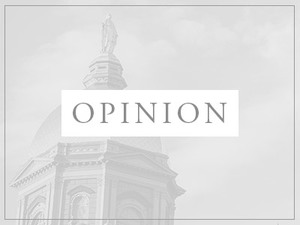 "
"
The 2020 Iowa Caucus was a daunting event to cover as student journalists. We arrived in Mount Vernon, Iowa, not entirely sure whether we could distill the unorthodox nominating process into an intelligible story for our Notre Dame audience. One encounter led to another, and our three-day trip resulted in a personable tour of a small town that carries a significant electoral responsibility.
The collaboration between Notre Dame Student Media, The Observer and the Journalism, Ethics and Democracy program allowed the two of us to work across mediums and do the work required of modern journalists. We were updating Twitter threads, posting on Instagram, taking photos and typing articles on deadline — all while driving across the greater Cedar Rapids area, from Mount Vernon’s coffee shop to the local college campus to a neighborhood being canvassed.
Monday night, caucus night, was the finale of our work and a trip that had been in the works since September. When we walked into our hotel room late that night, cameras in one hand and a long-awaited dinner in the other, we turned on the news to see the coverage of what we'd just witnessed first-hand.
The national media called the Iowa Caucus a failure. But to reduce the caucus entirely to a failure would be to dismiss the experiences we observed.
Over a three-day trip, one seemingly inconsequential moment stands out. An undecided caucus-goer, Bridget O’Connor, was moving from an unviable candidate to a viable one who would win delegates. She stopped to shake hands with a woman she had just encountered in the midst of the chaos and said, “It was so nice to meet you.”
Our political climate is polarizing, and it is tempting to focus on pessimism and failures. But it is worth noting that in the chaos of the caucus, we witnessed the unquestionable passion of voters who believed in their own body’s power to demonstrate support for a candidate. For every extra minute the caucus extended, we saw an extra minute of dedication to the democratic process.
It is easy to assess our democratic system in negative terms: chaos, division, failure. Iowa showed us that democracy still has the capability to excite, engage and form new bonds.
Iowa’s 41 delegates may be insignificant at the national level, and a single handshake may be insignificant in a lifetime. However, the belief in community in a time of iPhones and isolation carries weight.